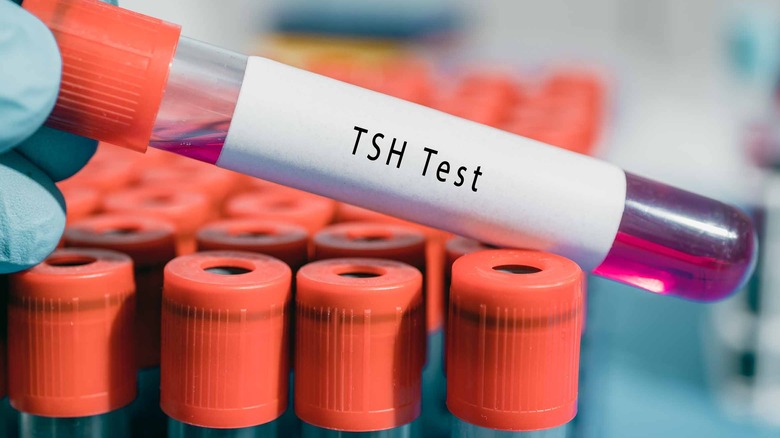What Does It Really Mean When Your Thyroid-Stimulating Hormone (TSH) Is Low?
According to MedlinePlus, the thyroid-stimulating hormone (TSH) is a vital chemical in our body that regulates thyroid function. Too high or too low levels of TSH indicate dysfunction of the thyroid. Per the Mayo Clinic, the thyroid is a small gland located at the bottom of the throat. It is responsible for producing two critical hormones — triiodothyronine (T3) and thyroxine (T4). Both affect your overall well-being, primarily when it comes to managing your weight, how your body utilizes energy, the temperature of the body, and the nervous system (via MedlinePlus).
Doctors recommend a TSH test to test the levels of TSH, T3, or T4 hormones and confirm whether or not you have thyroid issues. The University of California, Los Angeles (UCLA) Health reports that a TSH test helps determine whether you have hypothyroidism (underactive thyroid) or hyperthyroidism (overactive thyroid). Like with any other hormone, the normal ranges of TSH vary according to age, but in terms of gender, the difference is considerably low, reports Healthline. For example, the normal range for 18–50 years adults is 0.5–4.1 mU/L. In adults aged 51–70 years, the normal range is 0.5–4.5 mU/L, whereas it goes up to 0.4–5.2 mU/L for seniors aged 71 years or older.
What do low TSH levels mean?
According to MedicalNewsToday, low TSH levels indicate that you have hyperthyroidism or an overactive thyroid. It is a condition in which the thyroid produces too much of the hormone, causing the pituitary gland to produce less TSH. Per MedicineNet, you may need to take low TSH as seriously as abnormal thyroid hormone levels — it can lead to mood swings, compromised quality of life, and problems with overall wellbeing. The most common symptoms of hyperthyroidism include irregular or fast heartbeat, irritability, sudden changes in mood, difficulty falling asleep, rapid weight loss, fatigue, and weakness in muscles. It even includes digestive issues, such as diarrhea or frequent need to poop, reports MedicalNewsToday.
According to the Mayo Clinic, hyperthyroidism may also be detected by shivers or tremors in the fingers by a doctor. Some people also develop swollen eyes, which is a clear sign of an overactive thyroid. A TSH test is often recommended for older adults, as they don't often show typical symptoms of hyperthyroidism, reports the Mayo Clinic.


